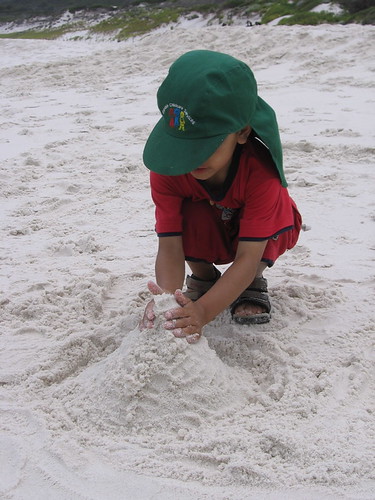Time for a stronger climate change response
This evening, I wrote to Senator Penny Wong, Australia's Minister on Climate Change, urging her to resist the amendments being put forward by the Liberal opposition to water down the Rudd government's proposed greenhouse gas emissions trading scheme (ETS), and instead to strengthen Australia's greenhouse gas reduction strategy.
The email was prompted by Who on Earth Cares, the Australian Conservation Foundation's public climate change campaign. Personally, I find the Rudd government's ETS a whimpy, futile attempt at cutting greenhouse gas emissions and slowing global warming. The ALP government's targets for cutting emissions are pitiful – and certainly not based on what scientists say is needed to prevent dangerous climate change. However, the Turnbull Liberal opposition's attempts to weaken (let's not use mealy-mouthed 'water down', shall we?) the government's scheme and demand greater subsidies for carbon polluters to be worse!
The Who on Earth Cares/ACF online campaigning tool allowed me to send an email to Penny Wong (automatically generated), urging her to strengthen Australia's greenshouse gas reduction, not weaken it. It says:
Dear Minister Wong,
This week the Liberal Party has made it clear that it proposes to weaken the Government’s emissions trading scheme.
I ask you, as someone that is very concerned about climate change, not to cave in to their proposed amendments and weaken Australia’s response to climate change.
I ask you not to give more handouts to the big polluters. Doing so would take the scheme backwards, and impact greatly on Australian taxpayers.
Instead, I ask you to strengthen and pass the emissions trading scheme, and take real action on climate change ahead of the crucial climate negotiations in Copenhagen this December.
Australia has so much to lose from a climate change catastrophe, yet so much to gain in a clean, low carbon economy.
We have abundant renewable energy resources, and huge potential to grow jobs and investment by grabbing a fair share of the global boom in clean technologies.
You have the ability to strengthen the emissions trading scheme by:
• Improving the target for reducing greenhouse pollution. 25% below 1990 levels by 2020 is the minimum credible starting point for Australia; and scientists say we should be making a 40% reduction
• Decrease handouts of free permits to Australia’s biggest polluters – now that the economy is back on track we should be winding back corporate welfare, not increasing it
• Ramping up investment in clean energy jobs and industries that will ensure Australia remains prosperous in the 21st century
• Using funds raised by the Carbon Pollution Reduction Scheme to help bring developing countries and their people out of poverty through clean economic development, and to cope with climate impacts that are already hurting them.
Australia has a history of leading by example and punching above its weight. I ask you to help continue this tradition.
I added some text below that, in the bit meant for us to 'personalise' our emails and, I guess, prove we are real people rather than the digital version of the rent-a-mob governments so maligned a decade and more ago. I'm sharing it here as an open letter to Penny Wong, Minister for Climate Change. Feel free to use it, or let it inspire your own emails or letters to the Minister. (Write to senator.wong@aph.gov.au)
To Penny Wong, Minister for Climate Change
On a further note, Minister Wong, I would like to strongly urge you to strengthen Australia's greenhouse gas reduction strategy with an insight from Victoria.
I am seriously concerned that in Australia we do all that we can do to reduce greenhouse gas emissions and prevent – not just slow down – dangerous climate change. If your government caves in to the demands of the Liberal Party and the carbon industry lobbyists, I strongly, strongly fear for the future of my children – my two boys, aged 9 and 3.
Last Saturday 17 October 2009, The Age reported that the huge aluminium smelters in Portland and Point Henry in south-western Victoria are costing Victorians more than $4.5 billion (by the time the contracts end in 2014 and 2016) in electricity subsidies for the smelters, and are likely to cost us more. Aluminium smelting is one of the most energy intensive – and greenhouse polluting – industries in the world, and it makes me angry that not only are we encouraging this industry, but we are actively subsidising it. Furthermore, these smelters are run on electricity generated from burning brown coal – one of the most carbon polluting forms of power generation there is!
If we instead subsidised and supported renewable energy such as solar power and wind turbines to anywhere the same amount, Australia would be in a much better position to tackle climate change!
Former Hamer and Kennett Liberal Victorian government minister Rob Maclellan, who was in the cabinet that decided to support and subsidise the smelters, was reported in that Age article as saying that decision was 'absolute madness' and a 'costly disaster' for our state. He clearly regrets those cabinet decisions! Please Minister, don't find yourself in a situation 10 years from now regretting any decisions you make to weaken Australia's greenhouse gas reduction strategy and throw greater subsidies at the carbon-polluting industries.
Victoria has already witnessed some of the most horrendous bushfires last summer, and I don't want my children living in a world where they have to fear every summer, rather than long for it and embrace the hope of its warmth and sunshine. This would be a horrendous future for us all. I want a carbon neutral future – and a brighter one – form my children. A future where my children will listen to Melbourne's weather report to figure out whether to take an umbrella or pack a jumper, or wear shorts and thongs – not whether to pack their belongings in a car and evacuate to a safe area to avoid a raging bushfire or a cyclonic storm.
Please – do the right thing. Strengthen Australia's greenhouse gas reduction strategy. Don't weaken it.
I welcome the opportunity to hear back from you about what you will do on this matter.
Regards,
Mark Lawrence
 From a (little) more innocent summer some 4 years ago, Jacob (now turning 9) building a sandcastle at Squeaky Beach in Wilsons Promontory. I say a little more innocent, or idyllic, as we were still amidst a terrible draught then, and the heatwave that Australia Day weekend was awful! Photo by me.
From a (little) more innocent summer some 4 years ago, Jacob (now turning 9) building a sandcastle at Squeaky Beach in Wilsons Promontory. I say a little more innocent, or idyllic, as we were still amidst a terrible draught then, and the heatwave that Australia Day weekend was awful! Photo by me.Labels: campaign, climate foresight, disaster, environment, fathers, global warming
Read more!













